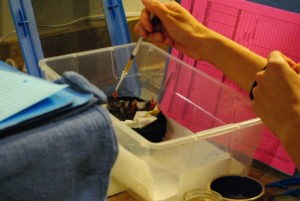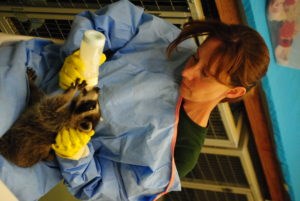This content was originally published by the Longmont Observer and is licensed under a Creative Commons license.
Halfway between Longmont and Lyons is a remarkable place called the Greenwood Wildlife Rehabilitation Center. Started in 1982 by the Humane Society of Boulder Valley, Greenwood helps orphaned and injured wildlife. Funding for the facility originally came from the family of Natalie Gneiser, a young woman who was killed trying to help a dog injured when it was hit by a car. Greenwood’s first patient was a raccoon who was burned in a fire. The raccoon miraculously survived and the Center was named “Greenwood” in its honor because green wood doesn’t burn. Greenwood moved to its current location in 1997. The facility includes a kitchen, diagnostic center, nurseries, and indoor and outdoor facilities. Construction has begun on an outdoor waterfowl environment that can be adjusted to accommodate different size birds.

Taking care of all those animals is a lot of work and last year 500 volunteers helped out. For example, some birds must be fed every 30 minutes. Volunteers are critical to the mission of Greenwood. There are only six year-round employees and 25 seasonal employees.
July is the busiest season for Greenwood. Currently there are more than 300 animals on site, but this will increase to more than 400 during the peak. During the summer, birds of all types are the most common species Greenwood sees. This includes songbirds and waterfowl. Mallards are the most common waterfowl species seen. At this time of year, some chipmunks and raccoons may also be brought to Greenwood. In the spring and in the fall, squirrels are the most common species. Squirrels have two breeding seasons per year.
When a person brings an animal to Greenwood, they answer questions at the front desk such as when and where they found the animal. Next, the animal is taken to the appropriate intake room where an initial assessment is made by a licensed wildlife rehabilitator.

Volunteers are always needed. If you are interested in becoming a volunteer, you can find information and an application on Greenwood’s website under the “Get Involved” tab. Greenwood requires a six month commitment because they need to be able to have reliable help available, particularly during peak times. It is hard work and you will get dirty, but it is also rewarding. You can also help by donating items for Greenwood’s thrift store in Boulder or by donating cash. You can also choose Greenwood when you shop at Amazon Smile.
As Jenny Bryant, communications and development manager, pointed out, “We have invaded their territory and there are humane ways to live together with wildlife.” Sometimes the best or most humane solution isn’t always the fastest when you are in conflict with wildlife. If you should find a baby animal, Jenny recommends waiting and observing the animal to ensure it is really abandoned. Many well-intentioned people have taken babies thinking they were abandoned when they weren’t. If you are unsure, you can call Greenwood at 303-823-8455 and they will help you determine the best course of action. They may be able to talk you through reuniting the animal with its parents over the phone. If the animal is abandoned, you can bring it to Greenwood. They are located on Highway 66 between Longmont and Lyons.


